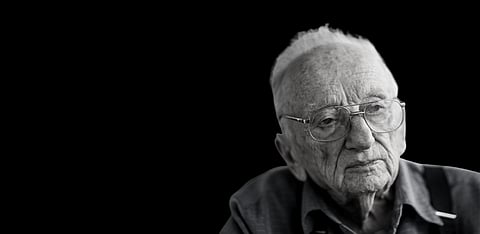

"Immediately, I got up to hold Ferencz's hand, ecstatic at having fortuitously met a person who is a part of the pages of history."
—
WHEN we had taken seats at the concluding session of the biennial conference of the International Law Association in Washington, D.C. in April 2014 to hear Dr Sundaresh Menon, Chief Justice of Singapore, a frail old man came and quietly sank into the chair next to me.
I casually looked at him. He smiled and turned to shake my hand to introduce himself, "I'm Ben Ferencz." I didn't expect the exhausted-looking old man to engage in conversation, but he appeared keen to talk.
After a brief exchange, Ferencz opened his briefcase and gave me a booklet titled Illegal Armed Forces as a Crime Against Humanity with his autograph stating "Never give up". At first glance, I thought that he was an activist for peace and disarmament. But, as I lazily opened the booklet, the footnote mentioned "The author is the former Nuremberg Chief Prosecutor of the Einsatzgruppen Case."
I was awestruck and dumbfounded. I told my colleague B.S. Nagar, seated to my right, "Hey, he was the prosecutor of the Nuremberg trial!" I instantly recalled what Prof. T.R. Subramanya had taught on the Nuremberg trials during my time at University Law College, Dharwad. Immediately, I got up to hold Ferencz's hand, ecstatic at having fortuitously met a person who is a part of the pages of history.
Nine years later, today morning I read an unfortunate report in the Indian Express titled 'Ben Ferencz, last living Nuremberg prosecutor of Nazis, dies'.
The Nuremberg trials were no ordinary trial to try those suspected of crimes. It was an unprecedented exercise in international law to bring to justice those who had committed crimes against peace and humanity by gross misuse of power through fake propaganda and hate speeches.
At the conclusion of the Second World War, the International Military Tribunal (IMT) was set up by the Allied powers under the Nuremberg Charter, signed on August 8, 1945. The charter mandated the trial of crimes against peace, crimes against humanity and war crimes associated with the European Axis powers led by Germany.
Criminal justice administered by the victorious powers came under criticism since it departed from the age-old principle that criminal law cannot have retrospective effect to punish those wrongs committed before the declaration of the law. There was also controversy over individuals in States that were party to the charter being prosecuted.
He became a strong proponent of the International Criminal Court. He advocated rule of law in international law to end warfare, and adjudicatory mechanisms to resolve conflicts.
The IMT tried hundreds of prominent Nazis, including German dictator and Nazi Party leader Adolf Hitler, the highest-ranking officer of the Nazi paramilitary organisation SS, Heinrich Himmler, and chief propagandist for the Nazi Party, Joseph Goebbels. At the conclusion of the historic trial of about a year, several accused were sentenced to death and life imprisonment.
Ferencz, a graduate of Harvard Law School, joined the US Army. He was honourably discharged in 1945, and was subsequently appointed as Chief Prosecutor of the Einsatzgruppen trial— one of the 13 Nuremberg trials. Since the trial followed continental procedure, the prosecutor had the responsibility to investigate and sift through the mass of evidence involving the death of about 80,000 Jews, communists, and gypsies, among others. The IMT found 20 Nazi officials guilty of crimes against humanity.
The life of Ferencz didn't end with prosecuting war criminals and Nazis. The horrors of crimes committed against humanity made him champion the cause of peace throughout his life. He said, "Nuremberg taught me that creating a world of tolerance and compassion would be a long and arduous task." He became a strong proponent of the International Criminal Court. He advocated rule of law in international law to end warfare, and adjudicatory mechanisms to resolve conflicts.
The United States Holocaust Museum has a centre named the Ferencz International Justice Initiative.
My salute to a grand old personality who lived 103 years for the cause of justice.